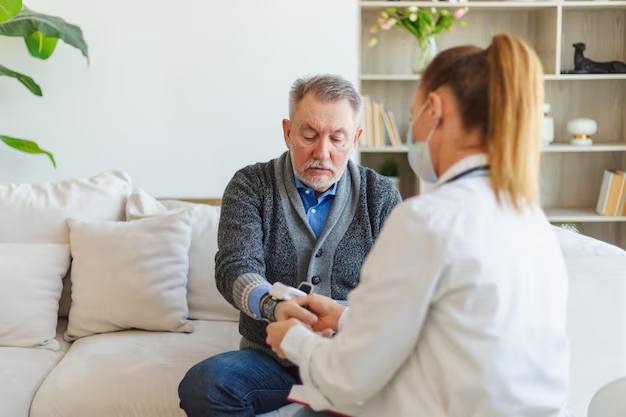Is Parkinson's Disease Treatable? Here’s What You Need to Know
Imagine waking up one morning to find your hand trembling uncontrollably. You're not nervous, cold, or anxious—yet the tremor persists. For over 10 million people worldwide, this is a part of daily life with Parkinson’s disease. Many wonder if Parkinson’s disease is treatable and, if so, what options are available. Let's delve deep into understanding this disease from multiple angles and explore what ‘treatable’ really means.
Understanding Parkinson’s Disease
Parkinson’s disease is a progressive neurodegenerative disorder that primarily affects movement. It occurs due to the deterioration of dopamine-producing neurons in a part of the brain called the substantia nigra. Dopamine is essential for regulating movement and coordination, and its reduction leads to the hallmark symptoms of Parkinson's.
Symptoms of Parkinson’s Disease
The signs and symptoms of Parkinson's can vary from person to person, but they typically develop gradually. Key symptoms include:
- Tremor: Often begins in a limb, frequently the hand or fingers.
- Bradykinesia: Slowed movement that can make simple tasks time-consuming.
- Rigidity: Muscle stiffness occurring in any part of the body.
- Postural Instability: Problems with balance and coordination.
Additionally, non-motor symptoms like depression, sleep disturbances, and cognitive changes are also prevalent.
Can Parkinson's Disease Be Treated?
The straightforward answer is yes; Parkinson’s disease can be treated, though it is currently not curable. Treatment focuses on managing symptoms, improving quality of life, and slowing disease progression as much as possible.
Medications
Medications play a critical role in managing the symptoms of Parkinson’s disease by either increasing dopamine in the brain or mimicking its action.
- Levodopa: Considered the most effective medication for Parkinson’s, it is converted to dopamine in the brain. It’s often combined with Carbidopa to reduce side effects.
- Dopamine Agonists: These drugs mimic dopamine effects in the brain, providing more control over symptoms.
- MAO-B Inhibitors: They help prevent the breakdown of brain dopamine by inhibiting the enzyme monoamine oxidase B (MAO-B).
- COMT Inhibitors: These agents extend the effect of levodopa by blocking an enzyme that breaks down dopamine.
- Anticholinergics: Used primarily for tremor control.
Surgical Options
For individuals where medications are not sufficient, surgical interventions may be considered, such as:
- Deep Brain Stimulation (DBS): Electrodes are implanted in specific brain areas and connected to a pacemaker-like device. DBS can help reduce symptoms significantly and adjust to changing needs over time.
Lifestyle and Home Remedies
Adopting certain lifestyle changes can complement medical treatment:
- Healthy Diet: Foods rich in antioxidants, like fruits and vegetables, may help protect nerve cells. Including omega-3 fatty acids and staying hydrated is also beneficial.
- Regular Exercise: Physical activity can significantly improve mobility, balance, and emotional well-being.
- Physical Therapy: Tailored exercises can help maintain muscle strength and alleviate rigidity and bradykinesia.
- Speech Therapy: Beneficial for those experiencing speech difficulties.
Emerging Therapies and Research
Research in Parkinson’s treatment is continuously evolving, with promising advancements:
- Gene Therapy: Investigating genetic factors that could reverse or halt Parkinson's progression.
- Stem Cell Therapy: Exploring the potential of pluripotent stem cells to generate dopamine-producing neurons.
- Protective Strategies: Developing drugs aimed at protecting neurons from damage.
The Role of Support Systems
Living with Parkinson’s is challenging, but support systems and counseling can play a crucial role in maintaining quality of life.
Caregiver Support
The involvement of families and caregivers is essential in providing emotional support and assisting with daily tasks, adapting as the disease progresses.
Support Groups
Connecting with others who share similar experiences can offer emotional relief and practical advice. Many organizations offer resources, both in-person and online.
Managing Parkinson’s: Practical Tips
While every person’s experience with Parkinson’s is unique, there are several strategies to enhance daily living:
- Prioritize Rest: Ensure sufficient rest, follow a regular sleep schedule, and create a calming evening routine.
- Routine Movement: Incorporate simple exercises, like walking or yoga, into daily routines to enhance flexibility and reduce stress.
- Home Safety: Modify home environments, using grab bars or ramps, to prevent falls and maintain independence.
- Mindful Eating: Focus on well-balanced meals and stay mindful of portions to manage any weight fluctuations.
- Stay Informed: Keep updated with the latest research and treatment options, empowering decision-making and treatments.
Looking Forward: Hope in Research
Advancements in Parkinson’s treatment are spurred by extensive research and increased understanding of the disease.
Personalizing Treatment
Precision medicine is leading the way by customizing treatments to individual genetics, aiding in more effective disease management.
Collaborative Efforts
International collaborations among research institutes and medical communities are critical in accelerating breakthroughs in Parkinson’s understanding and therapy.
Embracing a New Normal
Although there is no cure for Parkinson’s disease, many individuals lead fulfilling lives through a combination of medical treatment, lifestyle changes, and strong support systems. Empowering yourself with knowledge and seeking support make it entirely possible to live well with Parkinson's.
Quick Summary: Navigating Parkinson's 🌟
- Symptoms: Tremor, bradykinesia, rigidity, postural instability.
- Treatment Options:
- Medications: Levodopa, dopamine agonists, MAO-B inhibitors.
- Surgery: Deep Brain Stimulation (DBS).
- Lifestyle: Diet, exercise, physical/speech therapy.
- Emerging Research: Gene therapy, stem cell therapy, neuron-protective drugs.
- Support Systems: Caregiver involvement, support groups.
- Daily Living Tips:
- 🛌 Prioritize sleep to enhance recovery.
- 🏃♀️ Incorporate routine exercise for mobility.
- 🍎 Maintain a balanced, antioxidant-rich diet.
- Forward Outlook: Personalized treatments and collaborative research are paving the way for better management.
Remember, Parkinson’s management is about taking informed, proactive steps to stay active and engaged in life. 🌿

Related Articles
- Are There Environmental Causes Of Parkinsons
- Can Alcohol Cause Parkinson's
- Can Concussions Cause Parkinson's
- Can Females Get Parkinson Disease
- Can Head Trauma Cause Parkinson's
- Can Parkinson Disease Cause Dizziness
- Can Parkinson's Affect Eyesight
- Can Parkinson's Affect Memory
- Can Parkinson's Affect Speech
- Can Parkinson's Affect Vision
